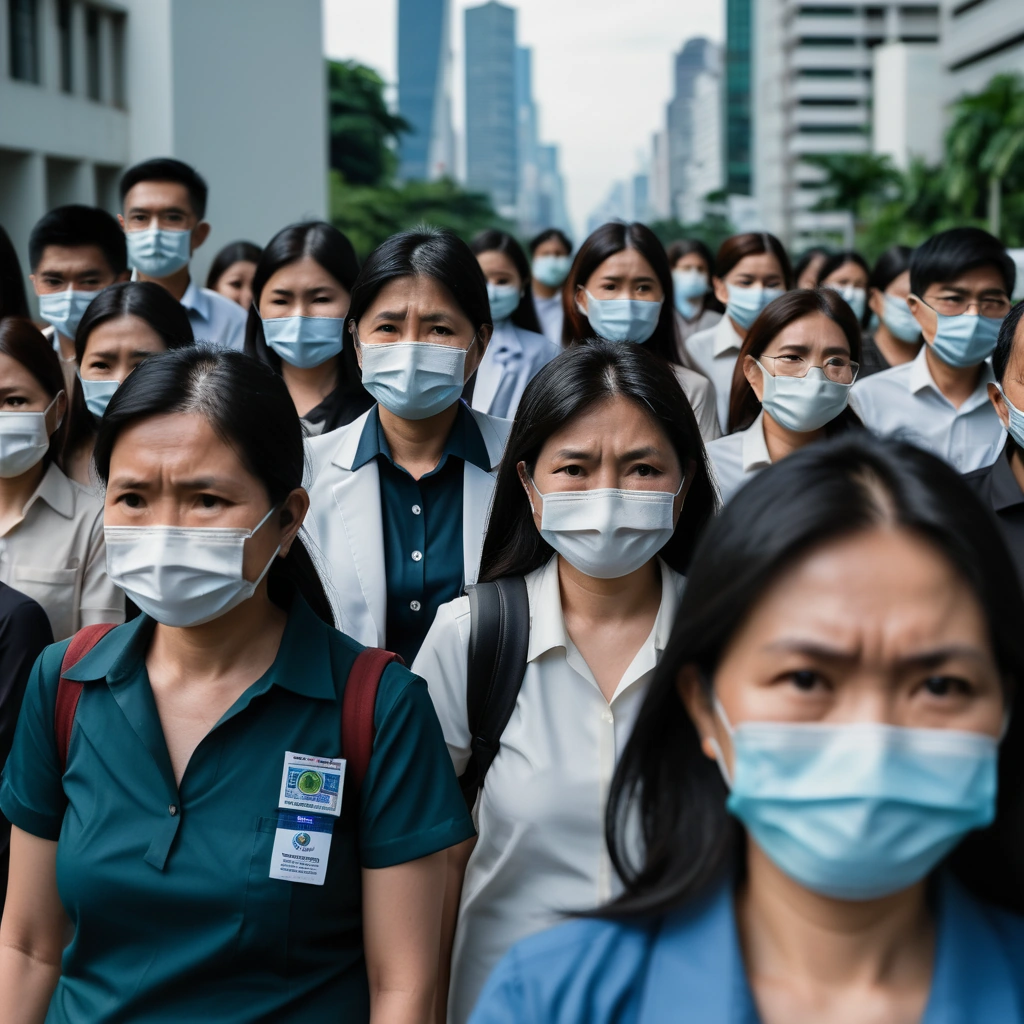OFWs in Crisis: Analyzing the Pandemic’s Impact and Charting a Path to Recovery
COVID-19’s Devastating Blow to OFW Employment: A Comprehensive Analysis
The COVID-19 pandemic delivered a seismic shock to the global labor market, and Overseas Filipino Workers (OFWs), the backbone of the Philippine economy through their remittances, were disproportionately affected. From healthcare heroes on the frontlines to hospitality workers serving tourists, and seafarers manning international vessels, OFWs faced unprecedented challenges. This Rappler-style analysis delves into the multifaceted impact of the pandemic, examining job displacement, wage reductions, and contract terminations across key sectors and major destination countries.
We will also evaluate the effectiveness of government initiatives and provide actionable advice for OFWs navigating this new reality, including insights from OFW advocacy groups and relevant government agencies. The recent news of contract terminations in European football, such as ‘Gladbach and Kramer terminate contract’ and ‘Report: Tottenham Terminate Midfielders Contract,’ while seemingly unrelated, highlights the broader economic uncertainty and job insecurity that many sectors are facing globally, a sentiment echoed by the challenges faced by OFWs.
The OFW COVID impact manifested in widespread OFW job loss across numerous sectors. Initial reports indicated that hundreds of thousands of Overseas Filipino Workers faced job displacement, with many experiencing wage reductions or outright contract terminations. Sectors like hospitality and tourism, heavily reliant on international travel, saw massive layoffs, impacting a significant portion of OFWs employed in hotels, resorts, and cruise lines. The maritime industry also suffered, leaving many maritime workers stranded on vessels or struggling to find new deployments.
Healthcare workers, while in high demand, faced immense pressure and increased risk of infection, leading to burnout and mental health challenges. These initial disruptions rippled through families back home, significantly impacting the Philippine economy. In response to the crisis, the Philippine government implemented various OFW assistance programs to mitigate the OFW COVID impact. The DOLE-AKAP (Abot Kamay ang Pagtulong) program provided a one-time financial assistance to displaced OFWs, offering a crucial lifeline for those who lost their income.
Repatriation programs were also launched to bring stranded Overseas Filipino Workers back to the Philippines, providing transportation and temporary accommodation. Furthermore, skills retraining programs, often in partnership with TESDA (Technical Education and Skills Development Authority), aimed to equip OFWs with new skills to enhance their OFW re-employment prospects in different sectors. However, the scale of the crisis often overwhelmed these initiatives, highlighting the need for more comprehensive and sustainable support systems. Moving forward, a multifaceted approach is crucial to bolster OFW re-employment and financial stability.
OFWs should actively explore online job boards and professional networking platforms, while exercising caution to avoid job scams. Financial literacy programs are essential to help OFWs manage their finances effectively, save for the future, and invest wisely. Career development opportunities, including upskilling and reskilling initiatives, can enhance their competitiveness in the evolving job market. Moreover, strengthening social safety nets and providing access to mental health support are vital to address the psychological toll of the pandemic. By embracing proactive strategies and leveraging available resources, Overseas Filipino Workers can navigate the challenges ahead and build a more resilient future.
Sector-Specific Impacts: Healthcare, Hospitality, and Maritime
The COVID-19 pandemic’s impact on Overseas Filipino Workers (OFWs) varied significantly across sectors, revealing vulnerabilities and disparities. While the healthcare sector initially saw increased demand for nurses and other medical professionals, this surge was quickly overshadowed by the immense pressure, burnout, and ethical dilemmas faced by OFWs on the frontlines. Many experienced contract breaches as healthcare systems buckled under the strain, forcing them into extended shifts with inadequate resources. This initial demand did not translate into long-term stability, as many OFWs faced job displacement after the initial waves of the pandemic subsided, highlighting the precarious nature of OFW COVID impact even in essential sectors.
The hospitality sector, heavily reliant on international tourism, suffered massive OFW job loss as global travel plummeted. Hotels, restaurants, and resorts in key destinations like Saudi Arabia, the UAE, Singapore, and Hong Kong implemented widespread layoffs and wage reductions, leaving countless Overseas Filipino Workers unemployed and financially vulnerable. The maritime industry also faced significant disruptions. Maritime workers, including deck officers and seafarers on international vessels, experienced port closures, stringent crew change restrictions, and reduced shipping activity.
These challenges led to extended contracts, delayed repatriation, and increased mental health strain. The pandemic exposed the fragility of global supply chains and the dependence on maritime workers, yet these workers often faced precarious working conditions and limited access to healthcare. Job displacement rates soared across all sectors, with estimates suggesting hundreds of thousands of OFWs were repatriated or left unemployed. Wage reductions became commonplace, with employers implementing temporary pay cuts or reducing working hours to mitigate financial losses.
Contract terminations became a harsh reality, leaving many stranded and uncertain about their future. In response to this crisis, the Philippine government implemented OFW assistance programs, including the DOLE-AKAP (Abot Kamay ang Pagtulong) program, offering one-time financial aid. Repatriation programs were also crucial in bringing stranded OFWs back home, though these efforts faced logistical challenges and resource constraints. Skills retraining initiatives, often in partnership with TESDA, aimed to enhance OFW re-employment prospects in a rapidly changing job market. However, the effectiveness of these programs varied, and many OFWs struggled to find suitable employment upon their return. The crisis underscored the need for more comprehensive and sustainable support systems, including improved access to financial literacy programs and mental health services. TESDA’s policies on certification became even more critical, as OFWs sought to enhance their skills and marketability in a shrinking job market, highlighting the importance of continuous career development opportunities for OFWs.
Government Initiatives: DOLE-AKAP, Repatriation, and Retraining
The Philippine government responded to the unprecedented OFW COVID impact with a range of initiatives, most notably the Department of Labor and Employment’s (DOLE) AKAP (Abot Kamay ang Pagtulong) program. This program aimed to provide a one-time financial assistance of PHP 10,000 (approximately USD 200) to Overseas Filipino Workers (OFWs) who experienced job displacement, wage reductions, or contract terminations due to the COVID-19 pandemic. While DOLE-AKAP offered immediate relief to many OFWs struggling to make ends meet, its impact was limited by the sheer scale of the crisis.
For instance, a maritime worker stranded abroad after his cruise ship was idled might have used the AKAP assistance to cover immediate food and lodging costs, but it wouldn’t address the longer-term challenge of finding new employment in a drastically altered maritime industry. The program served as a crucial stopgap measure, but the demand far outweighed the available resources, leading to delays and frustrations for many applicants. This highlights the need for more robust and sustained financial support mechanisms for OFWs facing unforeseen crises.
Beyond financial aid, repatriation programs were a critical component of the government’s response, aiming to bring stranded Overseas Filipino Workers back home amidst global travel restrictions and border closures. These repatriation efforts faced immense logistical hurdles, including coordinating flights, securing quarantine facilities, and managing the health risks associated with transporting large numbers of people across international borders. For example, the repatriation of healthcare workers from countries heavily affected by COVID-19 required careful planning to ensure their safe return and prevent further strain on the Philippine healthcare system.
Stories of OFWs stranded in airport terminals for days, or facing exorbitant airfares, underscored the challenges and limitations of these programs. While the government made significant efforts to bring OFWs home, the process was often slow and bureaucratic, leaving many feeling abandoned and unsupported. The pandemic highlighted the need for more streamlined and efficient repatriation protocols to protect OFWs in times of crisis. Recognizing that many OFWs would need to transition to new industries or upgrade their skills, the government, often in partnership with TESDA (Technical Education and Skills Development Authority), offered skills retraining programs.
These programs aimed to equip Overseas Filipino Workers with the necessary competencies to find re-employment in sectors with better prospects, such as information technology, business process outsourcing, or even entrepreneurship. For example, a hospitality worker who lost their job due to the collapse of tourism might enroll in a TESDA-certified course on digital marketing to enhance their employability in the online economy. However, the effectiveness of these skills retraining programs depended on several factors, including the quality of the training, the relevance of the skills to the current job market, and the availability of job opportunities after completion.
Many OFWs found that acquiring new skills was only the first step, and that they still faced significant challenges in finding suitable employment, particularly in a highly competitive job market. Furthermore, the long-term success of these programs hinges on aligning training initiatives with the evolving needs of the Philippine economy and global labor market. OFW advocacy groups and labor rights organizations have consistently argued that the government’s response to the COVID-19 crisis, while well-intentioned, was largely reactive and insufficient to address the systemic vulnerabilities faced by Overseas Filipino Workers.
They point to the need for more proactive measures to protect OFWs’ rights, ensure fair labor practices, and provide adequate social safety nets. For instance, stricter enforcement of recruitment regulations could prevent unscrupulous agencies from exploiting OFWs seeking employment abroad. Furthermore, expanding access to affordable healthcare and social security benefits for OFWs and their families would provide a crucial safety net in times of crisis. Expert observations emphasize the importance of diversifying the Philippine economy to reduce its reliance on OFW remittances, and promoting entrepreneurship among returning OFWs to create sustainable livelihood opportunities. The pandemic served as a wake-up call, highlighting the urgent need for a more comprehensive and long-term strategy to protect and empower Overseas Filipino Workers.
Actionable Advice and Resources for OFWs
For OFWs navigating re-employment or alternative livelihood options in the wake of the COVID-19 pandemic, a multi-faceted approach is essential. Online job boards like JobStreet, LinkedIn, and Indeed remain valuable resources for identifying both overseas and local opportunities. However, the OFW COVID impact has unfortunately led to a surge in job scams, necessitating heightened vigilance. Rigorously verify the legitimacy of employers and recruitment agencies through official channels like the Philippine Overseas Employment Administration (POEA). Financial assistance programs, such as those administered by OWWA and other government agencies, offer crucial temporary support to mitigate the effects of OFW job loss.
Skills retraining programs, particularly those offered by TESDA, are invaluable for acquiring new skills aligned with evolving industry demands. TESDA certification serves as tangible proof of competency, significantly enhancing re-employment prospects for Overseas Filipino Workers facing job displacement. Strategic career pivoting is paramount in the current landscape. OFWs should meticulously assess their existing skill sets and identify potential applications in growing sectors. For instance, hospitality workers, heavily impacted by the COVID-19 pandemic, can leverage their customer service expertise in call centers or online retail.
Maritime workers, facing contract terminations and wage reductions, might explore opportunities in logistics, supply chain management, or even renewable energy, given their technical proficiency. The government’s OFW assistance programs often include resources for career counseling and skills assessment, which can guide OFWs in making informed decisions about their career trajectory. These programs are critical in addressing the long-term economic consequences of the COVID-19 pandemic on Overseas Filipino Workers. Entrepreneurship presents another viable pathway for OFWs seeking economic independence.
Government initiatives, including low-interest loans and business training programs, are available to support small business ventures. OFWs can leverage their savings and international experience to launch businesses catering to local or even global markets. Networking plays a crucial role in this process. Connecting with fellow OFWs, industry professionals, and potential investors through online forums and industry events can provide invaluable support and guidance. While accessing financial assistance and navigating bureaucratic processes can be challenging, persistence and meticulous documentation are key to securing the necessary resources. Furthermore, the DOLE-AKAP and repatriation programs, while primarily focused on immediate relief, can also provide access to information and resources relevant to long-term career development. The COVID-19 pandemic has underscored the importance of financial literacy and diversification for Overseas Filipino Workers, making entrepreneurship a particularly attractive option for those seeking greater control over their economic future.
Conclusion: Building Resilience and a Sustainable Future for OFWs
The COVID-19 pandemic exposed the vulnerabilities of Overseas Filipino Workers (OFWs) and the Philippine economy’s reliance on their remittances. While government initiatives provided some relief, a more comprehensive and proactive approach is needed to protect OFWs’ rights, ensure their well-being, and promote sustainable economic development. This includes strengthening social safety nets, diversifying the economy, promoting entrepreneurship, and investing in education and skills training. OFWs themselves must also be proactive in seeking new opportunities, adapting to changing market conditions, and leveraging their skills and experience to create a better future for themselves and their families.
The challenges are significant, but with resilience, resourcefulness, and the right support, OFWs can overcome these obstacles and continue to contribute to the Philippine economy and global workforce. The Hidden Cost of Dreams: Inside the Complex World of OFW Recruitment Fees is a critical area to address, ensuring fair and transparent recruitment practices to prevent exploitation. Artificial Intelligence and the Future of Filipino Labor Migration is another key consideration, as AI could reshape traditional OFW employment sectors, necessitating proactive planning and adaptation.
The OFW COVID impact has been profound, marked by widespread OFW job loss due to contract terminations, wage reductions, and job displacement across key sectors. The hospitality industry, a significant employer of Overseas Filipino Workers, faced unprecedented shutdowns, leaving many stranded and without income. Similarly, maritime workers experienced prolonged periods at sea due to port closures and crew change restrictions. While DOLE-AKAP and repatriation programs offered immediate assistance, the long-term solution lies in equipping OFWs with skills relevant to evolving global demands.
TESDA’s skills retraining programs are crucial, but these must be aligned with industry needs and complemented by robust job placement support to facilitate OFW re-employment. Financial literacy is paramount for OFWs navigating this challenging landscape. The COVID-19 pandemic underscored the importance of saving and investing wisely, rather than relying solely on remittances for daily expenses. Government support programs should incorporate financial management training, empowering OFWs to make informed decisions about their earnings and plan for their future.
Moreover, promoting entrepreneurship among returning OFWs can create new economic opportunities and reduce reliance on overseas employment. Success stories of OFWs who have successfully transitioned to entrepreneurship serve as powerful examples, demonstrating the potential for self-sufficiency and contribution to the local economy. Access to microfinance and business mentorship programs can further support these endeavors. Looking ahead, a multi-faceted approach is essential to build resilience within the OFW community. This includes strengthening bilateral labor agreements with host countries to ensure fair treatment and protection of OFW rights.
Investing in education and skills training programs that align with future job market demands is also crucial. The Philippine government should actively promote diversification of the economy, creating more domestic job opportunities and reducing dependence on remittances. Furthermore, fostering a culture of innovation and entrepreneurship will empower OFWs to become agents of economic growth, both at home and abroad. The experiences of healthcare workers, hospitality workers and maritime workers during the COVID-19 pandemic provide valuable lessons for future preparedness and policy development.


